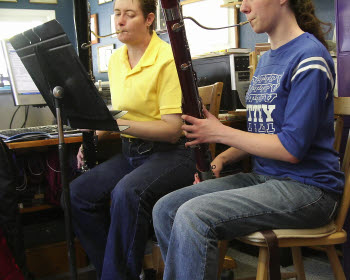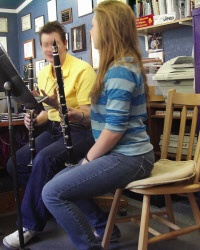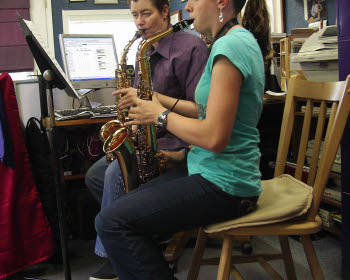Short term Coaching:
One to four 30-minute sessions, scheduled as time permits, at a cost of $45.00 a session. These short sessions are ideal for preparation for auditions, playing tests and seating challenges, or as an introduction to playing an instrument. Long term Coaching: Scheduling and Fees:
 S & D Music Studio offers 60-minute weekly private coaching sessions for members ages ten through high school at all levels of ability. Each session includes personalized consultation and recommendations to enable each member to reach stated short- and long-term goals, including advice on advanced playing skills, performance preparation and help with school music, if needed. Membership also includes individual computer work in the areas of music fundamentals, theory and composition, ear training, and music appreciation and history. Click here for more specific information about the activities, or scroll down.
Sessions are scheduled in two semesters during the school year, with an optional summer semester; and members may enroll at any time. Many members also choose to study a second instrument and these sessions generally alternate weekly between instruments. Coaching fees are $140.00 per month, with a signed contract (click here to read the contract), prepayment discounts, and an annual materials fee of $20.00. Additional family members choosing to enroll will enjoy a 30% discount. Payment may be made by personal or cashier's check, made out to S & D Music Studio; online payment via PayPal or Venmo; credit/debit card Tap-to-Pay; direct account transfer at Zions Bank or America First Credit Union; and even in cash. I'm PayPal Verified
Expectations: Members of S & D Music Studio are expected to attend their scheduled weekly coaching session and to engage in individual training sessions on a daily basis. Recommended training time is 15 minutes a day for elementary age students, 30 minutes a day for 7th and 8th grade students, 45 minutes a day for 9th  and 10th grade students, and 60 minutes a day for 11th and 12th grade students. Members are also encouraged to participate in outside music activities including attending live concerts and recitals, viewing television broadcasts, videotapes and DVDs, and listening to radio broadcasts and audio recordings. and 10th grade students, and 60 minutes a day for 11th and 12th grade students. Members are also encouraged to participate in outside music activities including attending live concerts and recitals, viewing television broadcasts, videotapes and DVDs, and listening to radio broadcasts and audio recordings. All members are highly encouraged to participate in the recitals at the end of each of the two school-year semesters, performing solos and ensembles for family, friends and fellow members. The January recital is primarily for school festival and college audition preparation, and the May recital consists of small ensembles performing more popular music including jazz selections, often with backup combo accompaniment, either live or prerecorded. Results: S & D Music Studio has a proud tradition of nearly every high school age graduate being awarded at least a partial music scholarship at the school of their choice, some after having been enrolled at the studio for as little as one year. A number of graduates with three or more years of study who have chosen to major in music have received full four-year tuition waivers, some with fees, books, private lessons, and work-study programs included. To ensure this success, each member is taught from an individual coaching outline, with school-age members being able to meet and exceed the Utah State Board of Education's Core Curriculum requirements in Secondary Education for Beginning, Intermediate and Advanced Band; as well as Music Connections/Aesthetics and Composition. Members are also encouraged to participate in School, District, Region and State Solo & Ensemble Festivals; to audition for the All-State Jazz Band, Symphonic Band and Orchestra programs; and to participate in Honor, Youth and Community Bands and Orchestras.
Adult Coaching: S & D Music Studio has a program specifically for adult members. This program is for adults who have never played, want to return to playing an instrument they once played in school, or who want to learn to play a related instrument. The coaching is highly individualized to reflect the goals of the adult learner; be that to play only for one's own enjoyment, to play for and/or with family and friends, to perform in church, or to join a community band or orchestra. 60-minute coaching sessions will be offered weekly throughout the year, with a signed contract (click here to read the contract), at $45.00 a session, which may be paid weekly, or as a larger sum in advance. Because of the responsibilities of employment, school and family, sessions may be canceled (or rescheduled) at any time without penalty. Payment may be made by personal or cashier's check, made out to S & D Music Studio; online payment via PayPal or Venmo; credit/debit card Tap-to-Pay; direct account transfer at Zions Bank or America First Credit Union; and even in cash.
S & D Music Studio Computer Activities Computer work is an integral part of instruction at the Studio and members will work on programs weekly during their individual coaching sessions. The work is supervised and activities are completed as recommended in order to best complement each member's individual interests and needs. Each member receives a schedule of activities which outlines the programs, including the sections to be completed, passing scores if required, and for recording the finish date. Currently, there are enough activities that a member working diligently on a weekly basis would need more than eight years to complete all of them. Members work through activities from basic skills to advanced mastery by working through the various levels of each program sequentially, returning again and again to the same programs and advancing in a spiral curriculum. The programs and activities are grouped into four main areas: Music Fundamentals: Members who are new to music start at the beginning, while members with prior experience are moved forward, in learning how music is set up with note names on a staff, and then progress through to the construction of scales and chords. They also learn about note and rest values, key and time signatures, dynamic, tempo, style and articulation indications, and intervals and transpositions. Theory and Composition: Theory and composition work includes recognition and construction of the various types of triads and 7th chords in root position and inversions, chord progressions, accompaniment figures, and modes, the realization of figured bass, and construction and harmonization of a melody. Members complete assignments which lead them step by step from constructing a simple melody to writing an entire composition. Advanced work is performed on the computer using current notation software, and members who are especially interested in composing receive additional guidance and assignments including writing compositions for private or public performance in recitals or at school, and for entering in competitions if desired. Ear Training: Members complete a large number of varied activities in learning to listen and respond to music – the most basic and essential skill needed as a musician. They work on recognizing and playing back simple to complex melodies, intervals, scales, chords, and progressions; learn to accurately count and execute simple to very complex rhythms; match pitches for tuning; and recognize elements including dynamics, articulations, motives, phrases, and forms in music. Music Appreciation and History: Every member's first assignment in the lab is to learn about their instrument – when and where it was invented, what types of music it can play, and what makes it unique. Members then go on to learn about what music is, what to listen for in music, how it has changed through the centuries, the styles and influences of other cultures around the world, the history of traditional Western Music, and the development of jazz.
Completion of all these varied activities supplement what members are learning in their coaching sessions and in their school band and orchestra programs. Together all these activities enable each member to meet and exceed the Utah State Board of Education's Core Curriculum requirements in Secondary Education for Beginning, Intermediate and Advanced Band, Music Connections/Aesthetics, and Composition; as well as a substantial portion of Advanced Placement Music Theory curriculum. |
